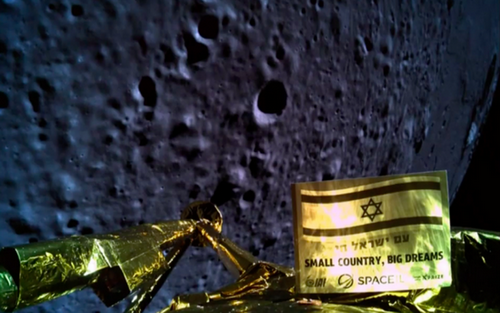
Israel’s Beresheet spacecraft crashes into the moon during landing attempt
The Beresheet spacecraft crashed into the moon’s surface during its attempt to land on Earth’s satellite on Thursday evening, dashing the hopes of hundreds of engineers who had worked on the project for years.
Israel could still claim the title of seventh country to make lunar orbit, and the fourth country to reach the lunar surface, though unfortunately not in one piece.
Advertisement
“As far as we can see, we were very close to the moon,” operation control director Alex Friedman said to engineers in the SpaceIL control room in Yehud, east of Tel Aviv, after communication with the spacecraft went down. “We are on the moon, but not in the way that we wanted to.”
The spacecraft successfully initiated the landing sequence, but a few kilometers above the moon’s surface the main engine failed, meaning the spacecraft could not properly brake in time to cushion its landing.
“Write this down, in three years we will get another spacecraft on the moon, and this one will land in one piece,” said Prime Minister Benjamin Netanyahu.
“If at first you don’t succeed, try again. We’ll try again, and next time we’ll just try it more gently.”
The spacecraft was budgeted at $100 million (NIS 370 million), a fraction of the cost of vehicles launched to the moon by major powers US, Russia and China in the past. It was a joint venture between private companies SpaceIL and Israel Aerospace Industries, funded almost entirely by private donations from well-known Jewish philanthropists, including South African billionaire Morris Kahn, Miriam and Sheldon Adelson, Lynn Schusterman, and others.
“Space is hard,” said Ehud Hayun, a space systems engineer at Israel Aerospace Industries. “I’m not crushed, I’m disappointed, but I’m very proud of what we achieved. We had a lot of success along the way, until the hard landing. We knew it was a risky mission, and the risk we were taking to build it cheap and fast. But we tried.”
SpaceIL co-founder Yariv Bash said it would take about two or three years to get another prototype ready for a moon landing. Netanyahu asked philanthropist Kahn to fund it again, though Kahn expressed hope that a second run would cost a little less.
Opher Doron, the general manager of the Space Division at Israel Aerospace Industries, said engineers were still studying the problem that led to the crash. Currently, they believed there had been a failure with one of the telemetry (altitude) measurement units, which caused a chain of events that ended up cutting the main engine about 10 kilometers (6 miles) above the moon’s surface. Without the main engine, the spacecraft could not properly brake in time to make a gentle landing, instead crashing onto the surface.
The three SpaceIL cofounders, who first decided to participate in the GoogleX Lunar Prize contest 8.5 years ago, said they would continue their mission of space education and of encouraging children to enter science fields.
“I want to turn to kids that might be watching us,” Yonatan Winetraub said in a press conference after the crash. “We didn’t reach the moon in one piece. That sucks. However, engineering and science are hard. Sometimes it doesn’t work the first time, sometimes it doesn’t work the second or third time. But it will work.”
“I want to encourage you to continue studying these things so you can one day reach the moon, and the stars,” he added.
“This is not what we were hoping for, but I think in the last few years we made history,” said Kfir Damari.
“We got Israel to places we couldn’t have imagined before. It was a long journey. We got Israel to the moon, together, this whole team. Now it’s the kids’ job to continue to build future spacecraft to reach the moon.”
“This is what happens, this is space,” said Morris Kahn. “Space has its dangers, it’s a frontier that’s very difficult. We accepted the challenge. I’m glad we did it. We chose to dream, we chose to do, and we were not afraid.”
“We are still the seventh country to get to the moon,” said Winetraub. “And that is still pretty incredible.”
Credit: The Times of Israel




